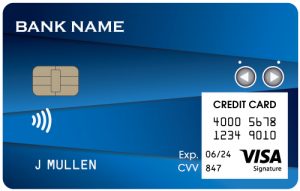When major technology companies started launching mobile-payments services a few years ago, many observers figured digitized and tokenized card credentials would soon replace old-fashioned plastic. But now, the chronically sluggish adoption and usage rates these mobile wallets have registered is lending new life to plastic cards. The twist is that the next generation of payment cards will be stuffed with technology associated with smart phones, including a display, push buttons, cellular connections, and messaging capability.
The first such cards could hit the market as early as this year. Dynamics Inc., a Pittsburgh-based developer, introduced its Wallet Card last week at the CES (formerly Consumer Electronics Show) in Las Vegas, with an assist from partners like Visa Inc. The card is standard size and thickness for a credit or debit card yet features a cellular chip from Sprint, a self-charging battery, a display, and buttons the cardholder can use to toggle between card accounts. The card can be instantly issued at bank branches and is expected to have a useful life well beyond that of conventional cards.

Dynamics says it’s in talks with international banks, including Emirates NBD, that could start issuing the Wallet Card within months. As for any U.S. issuers, there is “no specific” launch date right now, a company spokesperson says.
The card garnered headlines for Dynamics, a company that has largely labored in the shadows of the payments industry developing the capability to embed phone-like features in standard plastic cards. Now, an opportunity could have opened with the disappointing results of mobile payments. “We have always asked ourselves, why is everyone trying to move payments to the phone?” Jeff Mullen, founder and chief executive at Dynamics, tells Digital Transactions News. The plastic card, he says, is a “workhorse” for payments, with untapped potential that the right on-card technology can unlock.
Clearly, mobile-payments services from the so-called Pays, powerhouse tech firms Apple Inc., Alphabet Inc., and Samsung Electronics Co. Ltd., have so far failed to wow consumers. In a study released last week, the Federal Reserve Bank of Boston reported that 81% of financial institutions around the country that offer mobile payments and track enrollment say less than 5% of their customers have signed up.
By contrast, the plastic card is a familiar form factor, Mullen argues, constituting the “biggest device market in the world,” with 20 billion issued. “The phone is great for communication, but until you see people put their car keys or house keys on their phone, they won’t put their card keys on their phone,” he says.
Still, the Wallet Card could face formidable challenges. Previous efforts at next-gen smart cards, including products from startups like Coin and Plastc that allowed consumers to load multiple cards, came to nothing.
Another hang-up could be the card’s cost. Mullen won’t give specifics, but says “it’s not as high as you think.” Issuers could charge cardholders for both the card and the cellular signal, but Mullen doubts they will. That’s because the card offers them new messaging capability they can use to market lucrative services or combat fraud. And its durability will eliminate multiple re-issues, he adds. At the same time, issuers can avoid the cost of card re-issuance in case an account is compromised by simply shutting down the account on the card and replacing it remotely
But on this point, at least, observers are skeptical. “These cards will still be much more expensive to issue than will traditional cards, and there will be upfront setup to manage the over-the-air communications with the cards,” notes Rick Oglesby, principal at AZPayments Group, a Mesa, Ariz.-based consultancy. “There’s no proven consumer market for wallet cards so it will be highly speculative for issuers to invest in them. The business case for issuers will still not be strong.”
But while it may take a while, the Wallet Card may ultimately exert a strong appeal for issuers, say some experts. “The capability to immediately replace an account that has been compromised without issuing new plastic is a significant benefit,” says Thad Peterson, a senior analyst at Aite Group, a Boston-based consultancy.
Dynamics has attracted more than $110 million in investment capital and has been working on related technology for years. As early as 2010, it produced a card for Citigroup Inc. that featured buttons cardholders could press to apply loyalty rewards for a purchase or use a credit line.
Now, Mullen figures his company has the device banks and credit unions are looking for. “The Pays don’t have a win-win business model,” he says. “We do.”





